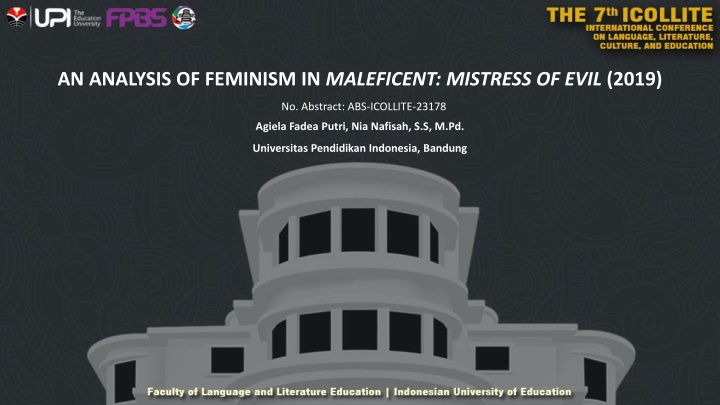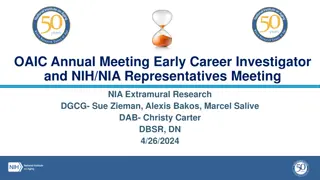Analysis of Feminism in Maleficent: Mistress of Evil (2019)
Maleficent in "Maleficent: Mistress of Evil" (2019) embodies care-focused feminism through her portrayal as a character who values nurturing and caregiving. This study utilizes Carol Gilligan's theory of care-focused feminism to analyze Maleficent's character development and interactions, highlighting her journey through the stages of caring ethics. By examining key scenes and dialogues from the film, the study explores how Maleficent's actions align with feminist principles of equality and nurturing.
Download Presentation

Please find below an Image/Link to download the presentation.
The content on the website is provided AS IS for your information and personal use only. It may not be sold, licensed, or shared on other websites without obtaining consent from the author.If you encounter any issues during the download, it is possible that the publisher has removed the file from their server.
You are allowed to download the files provided on this website for personal or commercial use, subject to the condition that they are used lawfully. All files are the property of their respective owners.
The content on the website is provided AS IS for your information and personal use only. It may not be sold, licensed, or shared on other websites without obtaining consent from the author.
E N D
Presentation Transcript
AN ANALYSIS OF FEMINISM IN MALEFICENT: MISTRESS OF EVIL (2019) No. Abstract: ABS-ICOLLITE-23178 Agiela Fadea Putri, Nia Nafisah, S.S, M.Pd. Universitas Pendidikan Indonesia, Bandung
INTRODUCTION Maleficent in Maleficent: Mistress of Evil (2019) really cares about the people and creatures around her, which resonates with care-focused feminism. Women just like men have ethics as caregivers to people around her (Gilligan, 1982) Many studies (e.g. Azizah & Fitri (2019); Becker, et al., (2016); Sinuraya et al., (2021) have focused on Liberal Feminism on children s films. The present study aims to fill the gap by exploring the portrayal of the feminist character in Maleficent through care-focused feminism.
LITERATURE REVIEW According to Gilligan (1982), care-focused feminism assigns a special value to care ethics, and this theory emphasizes concern for equality for both women and men. The ethics of care in particular for women develops in three stages (Gilligan, 1982). - Pre-conventional stage, in which women focus on the self by discovering what she needs of herself and what she wants to achieve. - Conventional stage, in which women focus on their responsibilities towards others manifested through care and being selfless. - Post-conventional stage in which women take control of their decision.
METHOD Research Design A qualitative research utilizing Carol Gilligan's theory of care-focused feminism. Also employing textual and descriptive analysis to gain in-depth analysis of Maleficent from evidence in the film text. Data Collection This study used the film Maleficent: Mistress of Evil (2019). In this study, the data were collected through several film aspects: the dialogue, the mise-en-sc ne, and the camera shot and angle. Data Analysis Procedure Watching the film repeatedly and carefully to find scenes or dialogues of Maleficent that represent care-focused feminism. Identifying the words or sentences and taking notes of the conversations which contain care-focused feminism. Classifying and analyzing according to Carol Gilligan's theory of care-focused feminism. Making a conclusion.
FINDINGS AND DISCUSSION Maleficent is portrayed as care-focused feminist based on these two findings: 1. She undergoes the three stages of care-focused feminism 2. She is portrayed to have care-focused characterization As someone knows what she wants, Maleficent wants to be a good mother. As a foster mother, she did not have a motherly instinct, but she tries to become a good mother for Aurora. Pre Conventional Stage She nurtures and gives loving attention to Aurora. In this film, she shows motherly love for her goddaughter, Aurora in three scenes. One of which is:
FINDING ONE Conventional Stage In this case, Maleficent has a responsibility toward the Moors because she is the Queen. This stage is also revealed through three scenes. One of which is : Post Conventional Stage In the post-conventional stage, Maleficent is responsible for her decisions and has consequences for her responsibilities. As a Queen, Maleficent is responsible towards the Moors and the Dark Feys; she has to be responsible for what she does. This is one of the example of the scene showing this final stage:
FINDING TWO AND DISCUSSIONS Characteristics of care-focused feminist 1. A Motherly Character 2. A responsible Queen 3. Firm and Fair Character Discussions There are three stages of findings that reveal how Maleficent is portrayed as a care-focused feminist. Similarity of the findings with other studies Implication of the current findings
CONCLUSION As a result, Maleficent's actions show her characterization as a care-focused feminist, which is someone who not only knows what she wants but also cares for others. In other words, the main female character in this study has moved toward care-focused feminism. Previously, some female characters in Disney films are portrayed as liberal feminists because they fight for their women's rights. In contrast, care-focused feminism is not the privilege of being a woman but privileging human beings regardless of their race. Gilligan (1982) said that a care-focused feminist is fighting for their rights and caring for others. The study points out the idea that the main female character has a richer range than previous ones.
REFERENCES Azizah, N., & Fitri, N. (2019). The representation of liberal feminism through the main character in ThePost movie. Journal Of English Language teaching, Vol. 3 No.2. Becker, S., Thomas, D., & Cope, M. R. (2016). Post-feminism for children: feminism repackaged in the Bratz films. SAGE Publications, Vol. 38(8). Belsey, C. (2005). Culture and the real : theorizing cultural criticism. Routledge. Gilligan, C. (1982). In a different voice. Harvard University Press. Hourihan, M. (2005). Deconstructing the hero: literary theory and children's literature. London: Routledge. Moleong, L. (2005). Metodologi penelitian kualitatif. Bandung: Remaja Rosdakarya. Lockyer, S. (2008). Textual analysis. SAGE. R nning, J. (Director). (2019). Maleficent: Mistress of evil [Motion picture]. Siagian, F. H. (2018). Feminism in patriarchal society reflected in the main character of Perempuan berkalung sorban movie. Sinuraya, J. S., Azhar, A. A., & Sazali, H. (2022). Analysis of semiotics representation of feminism in the Mulan film 2020. International Journal of Cultural and Social Science, 94-105. Tong, R. (2009). Feminist thought : a more comprehensive introduction. Avalon Publishing. Wiijayati, A. T. (2020). The character of Moana in the Disney movie script Moana seen from liberal feminism.























